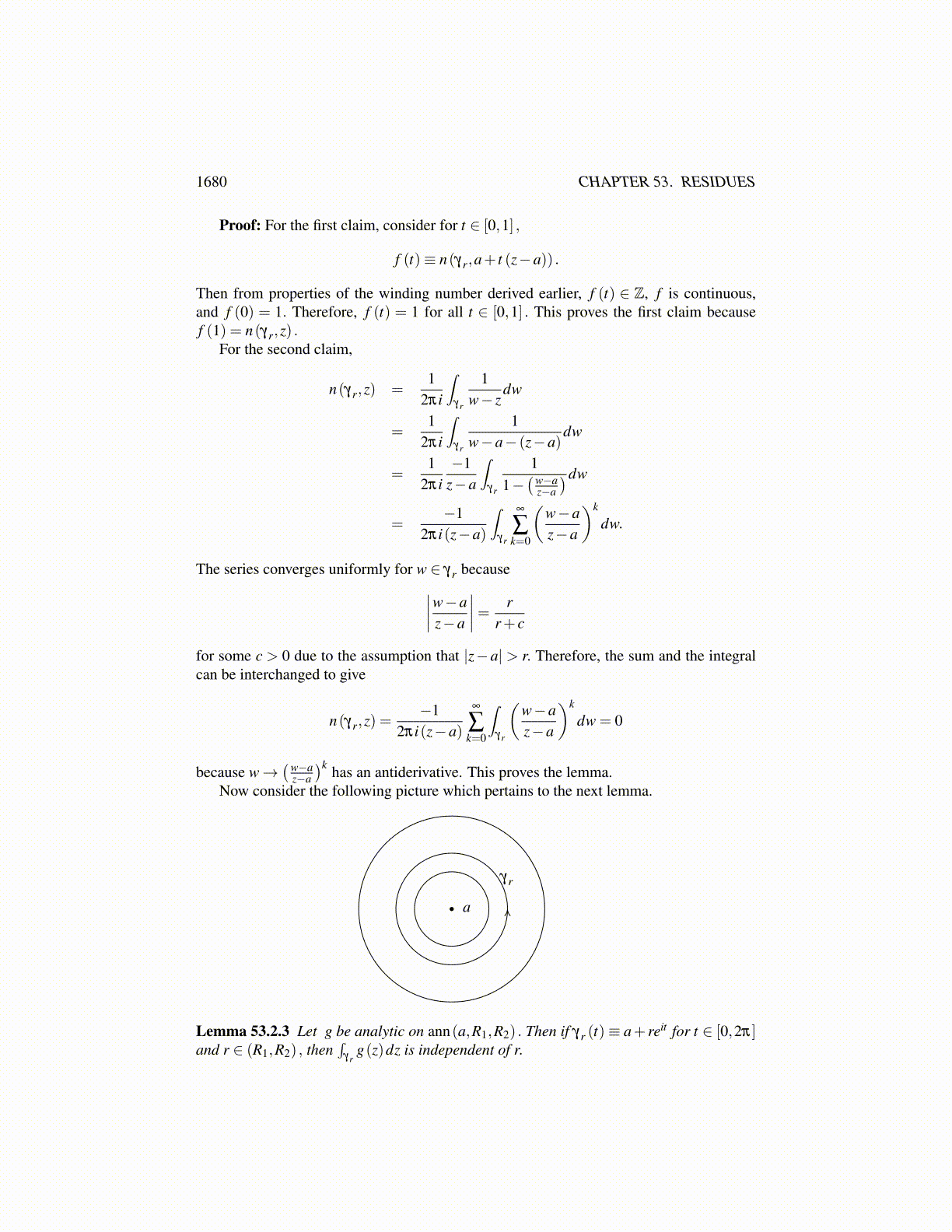
1680 CHAPTER 53. RESIDUES
53.1.3 A Different Formulation
In [115] I found this modification for Rouche’s theorem concerned with the counting ofzeros of analytic functions. This is a very useful form of Rouche’s theorem because itmakes no mention of a contour.
Theorem 53.1.6 Let Ω be a bounded open set and suppose f ,g are continuous on Ω andanalytic on Ω. Also suppose | f (z)|< |g(z)| on ∂Ω. Then g and f +g have the same numberof zeros in Ω provided each zero is counted according to multiplicity.
Proof: Let K ={
z ∈Ω : | f (z)| ≥ |g(z)|}. Then letting λ ∈ [0,1] , it follows that if
z /∈ K, then | f (z)|< |g(z)| and so
0 < |g(z)|− | f (z)| ≤ |g(z)|−λ | f (z)| ≤ |g(z)+λ f (z)|
which shows that all zeros of g+λ f are contained in K which must be a compact subsetof Ω due to the assumption that | f (z)|< |g(z)| on ∂Ω. By Theorem 51.7.25 on Page 1646there exists a cycle, {γk}
nk=1 such that ∪n
k=1γ∗k ⊆ Ω \K,∑nk=1 n(γk,z) = 1 for every z ∈ K
and ∑nk=1 n(γk,z) = 0 for all z /∈ Ω. Then as above, it follows from the residue theorem or
more directly, Theorem 53.1.2,
n
∑k=1
12πi
∫γk
λ f ′ (z)+g′ (z)λ f (z)+g(z)
dz =p
∑j=1
m j
where m j is the order of the jth zero of λ f +g in K, hence in Ω. However,
λ →n
∑k=1
12πi
∫γk
λ f ′ (z)+g′ (z)λ f (z)+g(z)
dz
is integer valued and continuous so it gives the same value when λ = 0 as when λ = 1.When λ = 0 this gives the number of zeros of g in Ω and when λ = 1 it is the number ofzeros of f +g. This proves the theorem.
Here is another formulation of this theorem.
Corollary 53.1.7 Let Ω be a bounded open set and suppose f ,g are continuous on Ω andanalytic on Ω. Also suppose | f (z)−g(z)| < |g(z)| on ∂Ω. Then f and g have the samenumber of zeros in Ω provided each zero is counted according to multiplicity.
Proof: You let f − g play the role of f in Theorem 53.1.6. Thus f − g+ g = f andg have the same number of zeros. Alternatively, you can give a proof of this directly asfollows.
Let K = {z ∈Ω : | f (z)−g(z)| ≥ |g(z)|} . Then if g(z)+λ ( f (z)−g(z)) = 0 it follows
0 = |g(z)+λ ( f (z)−g(z))| ≥ |g(z)|−λ | f (z)−g(z)|≥ |g(z)|− | f (z)−g(z)|